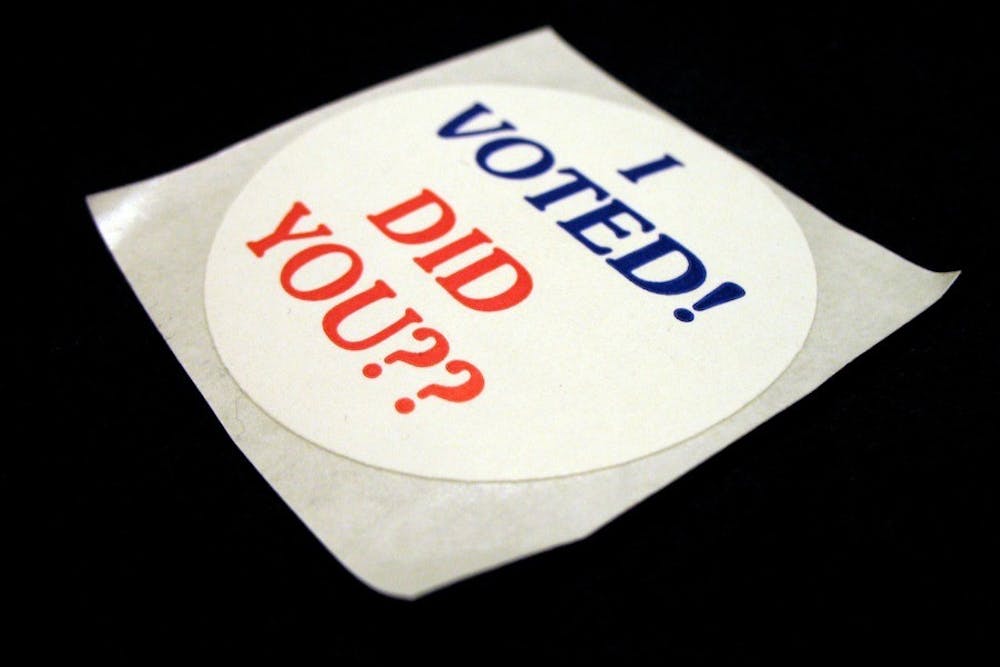By Maggie Callaghan, Senior Staff Writer
Nick Froehlich walks up to the table at Armstrong Student Center, across from the Miami Emporium before 9 a.m. He lays out flyers, registration forms and his computer, which has a bold 'voter registration' sign on his desktop. Then Prue Dana, a volunteer for the League of Women, a non-partisan organization that strives to increase citizen participation in politics, arrives to help him for the next few hours.
"Are you a registered voter? It only takes a minute to sign up right now," says Froehlich, a first-year member of College Democrats, as students pass him on their way to class.
Within an hour, 15 students were registered to vote in Ohio. Over five days, Associated Student Government, College Democrats, College Republicans and the Oxford chapter of League of Women hosted a voter registration drive in Armstrong Student Center. Students were able to register in time before the Ohio voting registration deadline, Feb. 16.
With just a month before the Ohio primary on March 15, these organizations made a final push to increase the number of registered voters on campus, an issue universities around the nation are trying to tackle.
Historically, citizens between the ages of 18 and 24 are two times less likely to vote compared to adults, according the U.S. Census Board in 2012. Only 38 percent of those between 18 and 24 years old voted in the 2012 presidential election, compared to 63 percent of those who are between 45 and 64 years old.
"We tend to make it hard and confusing for people to register to vote," said Patrick Haney, the chair of the Department of Political Science at Miami University.
Confusion is one of the many problems with college students' political activeness. Haney says other issues include a lack of interest when politicians only seem to be addressing a select group of people and the idea that whoever is put in charge has no direct impact on college students. This mentality worries Haney.
"I think these are all understandable, but regrettable - and maybe even dangerous - misconceptions," said Haney.
Students may think elections do not have any impact on them, but Haney says elections affect this generation more than others.
"[Students] have to live with the consequences of the election a lot longer than some of us will," said Haney.
Charlie Meyer, president of College Republicans, believes that the consequences of whoever is elected to office has a great affect on college students' future. Meyer says students need to be more aware and active as politicians have a great impact on the economy and graduates' success out of college.
"There has been stagnant growth for new grads," said Meyer. "This directly affects how grads get jobs out of college."
Beside the impact that politicians have on the future, Meyer and Froehlich, who come from different sides of the spectrum, both emphasize that voting is a duty and obligation of the American people.
"Participating in a democracy is something that is not to be taken for granted, as it is the No. 1 way for our voices to be heard," said Froehlich.
A similar voter registration drive was held in October, in which over 100 people were registered to vote. Hoping to have similar success this time, the groups are also looking at other methods to register students on campus.
Meyer has been working on partnerships with Greek members, going to fraternity houses and sorority suites to register voters as well as giving registration forms to residence advisers in dorms. The goal, he says, is to reach as many students as possible in an efficient manner.
Either way, these organizations are hopeful this drive will improve student's involvement with politics, especially with the 2016 Presidential election right around the corner.
"Politics is not a spectator sport," said Froehlich. "It's something we all should proudly participate in."
Correction: A previous version of this article misstated Nick Froehlich's year in school. He is a first-year, not a sophomore.

